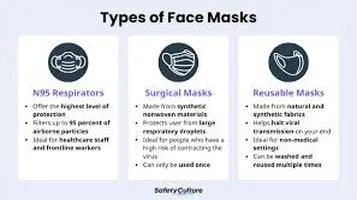Respiratory Masks – A Critical Safety Tool in Modern Times
Respiratory masks are essential protective devices designed to cover the nose and mouth, safeguarding the wearer from inhaling harmful airborne particles, gases, or vapors. They are commonly used in various settings, including healthcare, industrial environments, and public spaces, especially during outbreaks of infectious diseases. Respiratory masks come in different types, such as N95, KN95, surgical masks, and full-face respirators, each serving specific purposes and offering varying levels of protection. N95 masks, for instance, filter at least 95% of airborne particles and are widely used in healthcare settings. These masks are constructed with multiple layers of synthetic material, providing a snug fit to ensure minimal air leakage. Proper usage and fit are crucial for maximizing their effectiveness in reducing exposure to respiratory hazards.

Respiratory masks have become an indispensable part of our lives, especially in the wake of the COVID-19 pandemic. These masks, designed to cover the nose and mouth, serve as a primary defense mechanism against airborne pathogens, pollutants, and other harmful particles. With a plethora of options available in the market, it's essential to understand the nuances of different types of respiratory masks, their efficacy, comfort, and overall value.
Types of Respiratory Masks
To begin with, respiratory masks can be broadly categorized into three types: surgical masks, N95 respirators, and cloth masks. Each type serves a different purpose and offers varying levels of protection.
1. Surgical Masks: These are loose-fitting, disposable masks that create a physical barrier between the mouth and nose of the wearer and potential contaminants in the immediate environment. They are primarily designed to protect against large-particle droplets, splashes, or sprays. However, they do not provide a reliable level of protection from inhaling smaller airborne particles.
2. N95 Respirators: These masks offer a higher level of protection compared to surgical masks. They are designed to achieve a very close facial fit and are capable of filtering out at least 95% of airborne particles, including large respiratory droplets and smaller aerosols. Despite their effectiveness, N95 respirators can be uncomfortable for extended use due to their tight fit and the increased effort required to breathe through them.
3. Cloth Masks: These masks have gained popularity due to their reusability and eco-friendliness. While not as effective as N95 respirators or surgical masks, cloth masks can still provide a significant level of protection, especially when made with multiple layers of fabric. Their effectiveness can be enhanced by using a filter insert or opting for designs that offer a snug fit around the nose and mouth.
Efficacy and Protection
When it comes to protection, N95 respirators are the gold standard. They are highly effective at filtering out both large droplets and smaller airborne particles. However, their availability and cost can be limiting factors, making them less accessible for everyday use by the general public.
Surgical masks, while less effective against smaller particles, still offer substantial protection against larger respiratory droplets. They are widely used in healthcare settings and have been crucial in controlling the spread of infections.
Cloth masks, on the other hand, vary significantly in their efficacy. Factors such as the type of fabric, the number of layers, and the fit all play a role in their protective capabilities. Despite their variability, cloth masks have been recommended by health authorities as a practical option for the general public, especially when surgical masks and N95 respirators are in short supply.
Comfort and Usability
Comfort is a critical factor when choosing a respiratory mask, especially for prolonged use. N95 respirators, while highly effective, can be uncomfortable due to their tight fit and the effort required to breathe through them. They can also cause skin irritation and pressure marks around the nose and mouth.
Surgical masks are more comfortable for extended wear, as they are looser-fitting and easier to breathe through. However, their loose fit can compromise their protective capabilities, particularly against smaller airborne particles.
Cloth masks offer the most comfort and breathability, especially when made from soft, breathable fabrics like cotton. They are also adjustable, allowing for a better fit. However, the level of comfort can vary based on the design and materials used.
Environmental Impact
One of the significant advantages of cloth masks is their reusability, which makes them an environmentally friendly option. They can be washed and reused multiple times, reducing waste and the demand for disposable masks.
Surgical masks and N95 respirators, being single-use items, contribute to environmental pollution. The sheer volume of these masks disposed of daily poses a significant challenge for waste management systems. As such, while they offer superior protection, their environmental impact is a consideration that cannot be overlooked.
Cost and Accessibility
Cost is another critical factor influencing the choice of respiratory masks. N95 respirators, being more advanced and effective, are also more expensive. Their high cost can be prohibitive for regular use by the general public.
Surgical masks are relatively affordable and widely available, making them a practical option for many. However, their single-use nature means that costs can add up over time.
Cloth masks, while varying in price based on design and materials, offer a cost-effective solution in the long run due to their reusability.
Conclusion
In conclusion, respiratory masks are a vital tool in protecting against airborne pathogens and pollutants. Each type – surgical masks, N95 respirators, and cloth masks – has its own set of advantages and limitations. N95 respirators offer the highest level of protection but at the cost of comfort and affordability. Surgical masks provide a good balance of protection and comfort but are less effective against smaller particles. Cloth masks, while offering the least protection, are the most comfortable and environmentally friendly option.
Ultimately, the choice of respiratory mask depends on the specific needs and circumstances of the user. For healthcare professionals and high-risk individuals, N95 respirators are the best choice. For everyday use by the general public, surgical masks and cloth masks provide a practical and effective solution. As we navigate through these challenging times, understanding the strengths and limitations of each type of respiratory mask is crucial in making informed decisions to protect ourselves and our communities.






